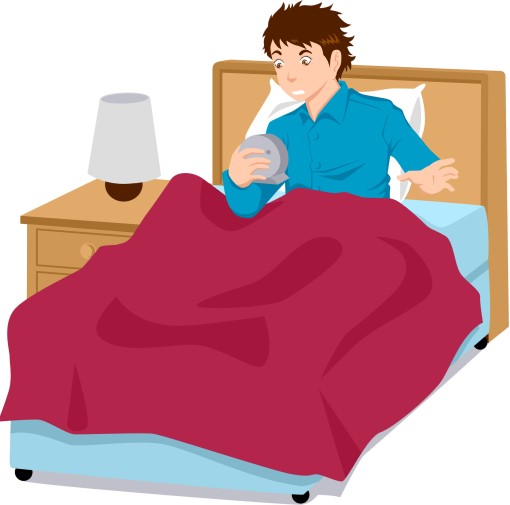
15 Practical remedies worth a try to keep from waking up late for work
By Jason Wooden, PhD | October 2, 2021
If you struggle with waking up late for work, there’s more at stake than you realize – lack of focus, moodiness, poor job performance, relationship strain, and increased risk for a myriad of life threatening health issues.
For easier mornings, you’re options include morning hacks, better sleep hygiene, natural sleep aids, sleep meds, sleep counseling, and various other insomnia remedies to help you fall asleep on time.
You should also consider seeing a doctor to check for underlying health issues and consider making changes to your work situation.
CONTENTS:
1) There’s more at stake than you realize
2) Are you staying up too late?
3) How much sleep do you really need?
4) Why you need to get more serious about sleep hygiene
5) 15 insomnia remedies to help you fall asleep
6) Hacks to make getting up and ready easier
7) There may be something more serious going on
8) Time for a change?
There’s WAY more at stake than you realize if you’re waking up late for work
Is there anything more stressful than waking up late for work, rolling out of bed, and making a mad dash to get ready?
In past surveys, roughly 1 in 3 employees were found to show up late to work at least once a month.
And 1 in 5 said they showed up late to work at least once a week.
While it’s not clear how much of this was because people woke up too late, we do know that poor sleep is a huge issue. In fact, every night 1 in 3 adults struggle with insomnia and wake up sleep deprived.
With numbers like that, you’re likely not the only one struggling with waking up late for work.
There are lots of reasons why people have a hard time waking up.
Perhaps, you’re one of those night owls or you’re not a morning person. It could be you’re just a poor sleeper or there’s something more serious going on.
If waking up late has become a regular occurrence, you should know there’s WAY more at stake than making the workday more stressful and jeopardizing your job.
After a night of poor sleep, your brain doesn’t work as well as it should, you have a harder time learning, and don’t cope as well.
Sleep-deprived people don’t perform as well on the job, have a harder time with everyday households tasks, and may struggle with relationships.
Long-term, poor sleep can increase your risk for high blood pressure, heart disease, obesity, anxiety, depression, and dementia.
That’s a whole lot at stake.
Let’s take a look at what’s happening and what you can do about it.
Are you waking up late for work because you stay up too late?
One of the biggest reasons people struggle to wake up in time for work is because they stay up way too late. I know I’ve been guilty of this.
When I was younger, I was able to get away with it. Now that I’m older I pay the price.
Besides being a night owl, there are all sorts or reasons people stay up past their bedtime.
Sometimes you’re just feeling restless and not ready for bed after a busy day…
Or maybe you’re just trying to do too much in the evening…
There’s also REALLY BAD habits like getting on social media or YouTube at night. It’s so addictive because there’s always something new and engrossing to click on.
That’s bound to keep you up past bedtime. It’ll also get you wired up and make it harder to fall asleep.
And let’s not forget how the light from electronic screens can make it harder to sleep.
(They emit bright blue light that can throw off the body’s natural sleep-wake cycle.)
Regardless of why you stay up too late, it’s costing you at night and day.
So, if you’re frustrated from waking up late for work, you really need to rethink how sleep fits into your life.
You really need to make going to be on time your number one priority at night.
How much sleep do you really need?
The biggest thing you can do if you’re worried about waking up late for work is to make sure you’re getting adequate sleep every night.
As obvious as that is, so many people skimp on sleep.
Just to be clear, some of the signs you’re not getting enough sleep include:
- feeling tired
- moodiness
- it’s harder to focus and think
- forgetfulness
- low energy
So, you’re probably wondering how much sleep do you really need?
The thing to keep in mind about sleep is that how WELL you sleep is just as important as how LONG you sleep.
To wake up feeling rested and ready for the new day, it’s important to get enough deep restful sleep.
That means you need to get enough cycles through the four sleep stages:
N1 stage: between awake and falling asleep
N2 stage: onset of sleep
N3 stage: deep restorative sleep
REM stage: rapid-eye-movement and dreams
Those later stages are really important because it’s when your body restores and replenishes itself.
A full sleep cycle through all four stages is roughly 90 minutes long. Sleep experts say that adults need at least four to five cycles to feel rested.
That works out to about 6 to 9 total hours of sleep for an adult.
In reality, everyone is a little bit different. That’s why 6 to 9 hours is a ball park estimate.
Some people can get away with less and some will need more.
However, if your job or life is extra stressful, you may need even more sleep than the average Joe.
You’ll need to find the sweet spot for you.
If you want to wake up refreshed and in time for work, you need to get WAY more serious about your sleep hygiene
You need to do everything you can to keep your sleep on track if you want to wake up on time and ready to go to work.
Unfortunately, there’s a long list of things that you could be up against since so many different things affect sleep.
So, we need to talk about the foundation for quality sleep.
Like many things in life, it’s habits.
We are all slaves to habits. Unfortunately, too many people have bad habits and practices surrounding sleep.
That’s where sleep hygiene comes into play.
What you do during the day, evening, and at night can make a big difference for your sleep.
Sleep hygiene involves the everyday habits that can make or break sleep. It sets the stage for deep restful sleep.
Good sleep hygiene will help you make the best of your sleep opportunities. Poor sleep hygiene can sabotage the other things you do to improve your sleep.
That’s why sleep hygiene is where the rubber hits the road.
Start with the habit of keeping to a regular evening and morning routine where you go to bed and wake up the same time every day.
Here’s something to think about…
Would you believe one study found that waking up just an hour earlier than usual could reduce your risk of depression by 23%?
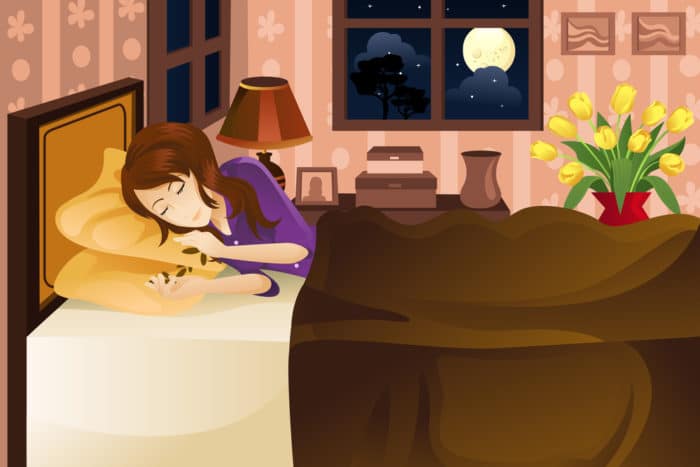
For better sleep you should:
- keep consistent wake up & sleep times
- avoid naps
- exercise and movement during the day
- avoid large meals, alcohol, or stimulants such as caffeine before bedtime
- maintain a regular bedtime routine
- include stress management strategies in your daily routine
- avoid using TVs, laptops, or other electronics before sleep
- keep your bedroom dark, cool, quiet, & relaxing
15 Insomnia remedies to help you fall asleep and wake up on time for work
There are many reasons people have a hard time falling asleep and wake up late for work.
Some are obvious and some not so obvious.
I’ve already mentioned restlessness but there’s also stress and anxiety, two of the most common causes for insomnia. It’s hard to drift off to sleep when your mind is racing.
People who sleep poorly are often dealing with more than one issue.
Depending on your situation and specific sleep challenges, there are plenty of things worth a try to help with your sleep:
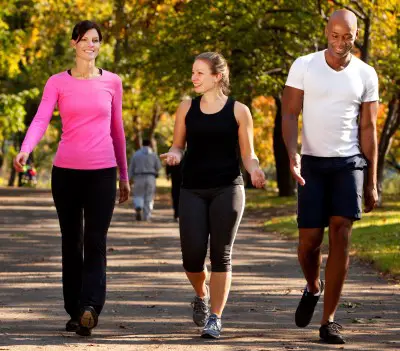
1) Exercise
Did you know that physical activity triggers the release of endorphins and other chemicals that improve mood? It can also reduce stress, anxiety, and depression.
Regular exercise also promotes deeper sleep.
So, get out for a brisk walk in the park, go for a swim, or dance to your favorite music.

2) Natural daylight
Go outside during the day and get natural light. Open up the windows and flood the room with daylight.
Sunlight is a powerful tool that can help the body keep your sleep-wake cycle on track. Natural daylight has been shown in studies to promote sleep.

3) Light reading
Reading can take your mind off things, be sure to avoid those page turners that keep you up too late.

4) Relaxing music
Calming music has been shown in studies to reduce anxiety and help people relax. In sleep studies, subjects fall asleep faster and experience better sleep quality.
What you want is music that will sooth you to sleep, not something that will get your heart racing. Slow rhythm songs (60 to 80 beats per minute) is what’s been shown in studies to improve sleep.
Popular choices include classical and new age music. You may have to experiment a little to figure out what works best for you.

5) Sleep music tracks
Similar to calming music, sleep tracks are designed to help people fall asleep more quickly. Often, they combine quiet music with nature sounds.
You can purchase them online or stream them for free on YouTube and phone apps.
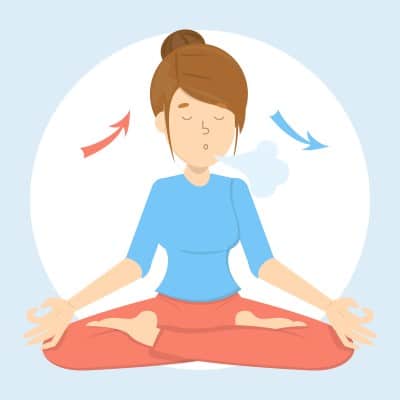
6) Deep breathing
Deep breathing is a simple way to calm the body. One popular technique is 4-7-8 breathing pioneered by Dr Andrew Weil.
It involves holding your breathing to various counts of 4, 7 and 8.
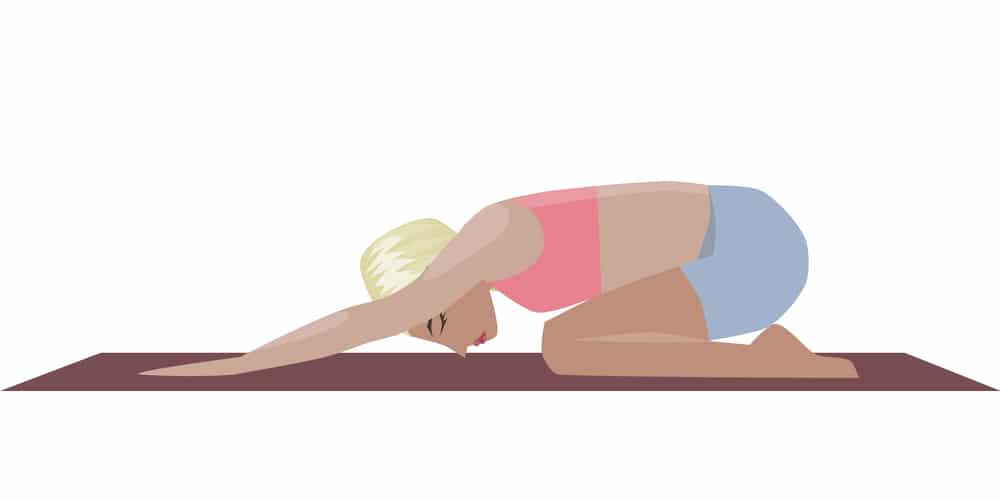
7) Gentle stretching
Light stretching can help the body relax. It may also help with the aches and pain that keep people from sleeping deeply.
Learn more: 8 Stretches for Your Best Night’s Sleep (SleepAdvisor.org)
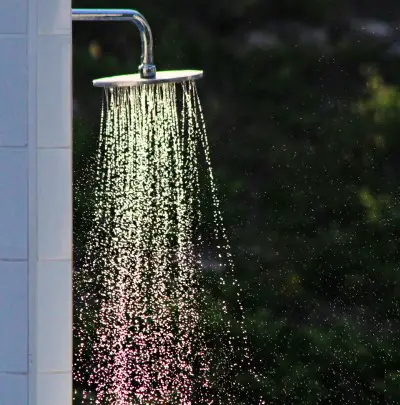
8) A warm shower
Did you know your body temperature naturally dips at night before bedtime? It’s one of the things that can signal your body it’s time for sleep.
A warm shower or bath can help you relax while raising your body temperature. When finished you return to a cooler bedroom and get a temperature saying it’s time to sleep.

9) Write it down
Sometimes when there’s a lot on your mind, it helps to put things down on paper.

10) Progressive muscle relaxation
Progressive muscle relaxation is a technique where you tense and then relax one muscle group at a time. It has been found to help with stress and insomnia.
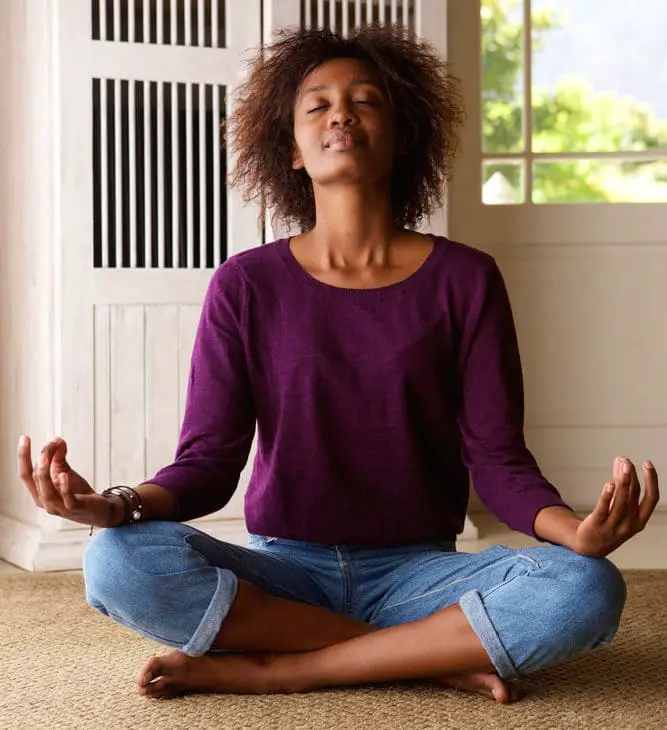
11) Meditation
Mindfulness meditation is a mind-calming technique that involves focusing on your breathing and keeping your awareness on the present moment.
This simple technique has been shown in studies to promote sleep.

13) Natural sleeping aids
There are all sorts of natural supplements that can help the body transition to sleep. Some have been scientifically tested while others have not.
Among the more popular are melatonin, chamomile, hops, and valerian root.

14) Sleep counseling
Did you know that counseling is one of the most effective treatments for insomnia?
There’s a strong connection between the mind and body. Your mind, brain, behaviors, and body can interact in powerful ways that affect health and wellness.
Too often, people develop bad attitudes, habits, and associations that make it harder to sleep.
A specialized type of sleep counseling, cognitive behavioral therapy (CBT-i for short), can help identify and change thoughts and behaviors that affect sleep. It’s one of the most effective insomnia treatments.

15) Sleep teletherapy
With modern computer technology, you can now get sleep counseling from the comfort of your own home thanks to Sleep Easy.
It’s a first of a kind online counseling program developed by Dr. Richard Shane based on his clinical work helping thousands of people suffering from chronic insomnia.
We’ve partnered with Sleep Easy to help get the word out and we’re urging all of our readers take a look at them.
Another reason we’re including them on the list is because Dr. Shane’s approach has been used for decades to help first responders.
Sleep Easy’s teletherapy is confidential.
Hacks to make waking up on time and getting ready for work easier
Have things gotten to the point where you dread mornings? Depending on your situation, waking up late for work may not be your only issue.
Between life, family, and work, there’s plenty to stress about when you wake up.
Let’s look at what you can do to keep the stress down and make your mornings a little bit easier:
Keep your alarm away from your nightstand
This will force you to get out of bed to turn it off. It will also make it a little less tempting to hit the snooze button.
Keep your curtains open
Natural daylight in the morning can help the body transition from sleep to wakefulness.
Be prepared
Having everything ready to go the night before can really simply your mornings. Get your clothes out and your lunched packed.
Shower the night before
A time saver and one less thing to think about.
Shower in the morning
Everyone is a little bit different. Some people find that a morning shower helps them jumpstart their day.
Think of what else you can do
The idea is to do everything you can to make things less stressful and there’s less thinking in the morning. Take a look at your current routine and see what else you can adjust.
If you’re waking up late for work, there could be something more serious going on…
If you’re struggling a lot to fall asleep, stay asleep, and waking up, there may be things you’re unaware of troubling your sleep:
1) Underlying health issues
Did you know there could be something going on with your body that’s making it harder to sleep? There’s a long list of health challenges that can cause or worsen sleep issues.
It’s obvious what ongoing pain and body aches does to sleep. That will keep you tossing and turning throughout the night.
Allergies, asthma, heart burn, heart disease, and diabetes are also on the list of trouble makers.
2) Underlying sleep disorders
You may be living with an undiagnosed sleep disorder. There are many different types, some more common than others.
Shift work disorder is common among people who work evenings, nights, or on rotating shifts.
It’s just hard to keep your natural sleep clock on schedule when your sleeping at odd hours and out of sync with the sun. People with shift work disorder have trouble falling asleep and struggle with excessive sleepiness when awake.
Obstructive sleep apnea is a common sleep disorder affecting as many as 1 billion people worldwide.
It happens when the muscles in the throat relax too much during sleep causing your airway to collapse and restrict the flow of oxygen. It’s a real sleep killer that keeps you out of deep restorative sleep so you wake up in the morning feeling as if you haven’t slept at all.
4) Depression
Did you know there’s a strong link between poor sleep and depression? Many people struggling with depression also struggle with sleep.
And , according to studies, people with insomnia are more likely to develop major depression associated with sleep problems.
If you’re not careful, you can get in a vicious cycle.
If you haven’t had a recent checkup, it’s really worth getting one. If you don’t deal with these underlying issues, you may be just sticking a band aid on things.
Your doctor can check for things you may not be aware of. They can also make sure any meds you’re taking are not causing problems for your sleep.
Is it time for a change?
If waking up late for work has been a fact of life for you, it may be worth making some changes to your work situation.
Ongoing stress from a job and the required work hours can really take a toll. Some people are able to manage night shift while others aren’t.
Depending on how serious things are, options worth considering are:
Adjusting your work hours slightly – starting a couple hours later may help
Working from home – eliminating the commute may free up some time for more sleep
Changing your work shift – switch from nights to days or from swing to regular hours
Change the type of work you do – you may be in a profession that has crazy unpredictable hours and tons of stress
You may also be interested in:
Insomnia diagnosis and treatment
What to do if you’ve slept through your alarm for work
How to keep from falling asleep at work
How to stay awake at work while pregnant
More sleep-friendly ways to relax at night
How to get to sleep after one too many energy drinks
9 Things worth a try if you drank too much coffee
What to do if too much light is keeping you awake
12 Things to try if a noisy neighbor is keeping you from sleeping
Sources:
1. “The Real Reasons Employees Are Late for Work”, 2020, Business News Daily
2. “How Often Are Americans Late For Work? [Infographic]”, 2014, Forbes
3. “Talking Points”, World Sleep Society website
4. “What Happens When You Sleep?”, 2020, Sleepfoundation.org
5. “Enhance Your Sleep Cycles”, 2016, Alaska Sleep Clinic
6. “Here’s why morning people are happier — and how to ‘hack’ your body clock to be one”, 2021, cnbc.com
7. Effects of light on human circadian rhythms, sleep and mood. Somnologie (Berl). 2019 Sep;23(3):147-156.
8. “Depression and Sleep”, 2021, Sleepfoundation.org
9. “Insomnia: The Mind, Body, and Emotion Connection”, American Sleep Association
Connect with us:
About Us
Better Sleep Simplified® was founded as a place for you to get clear and well-researched information.
Our goal is to make sure you know about your options so that you take action sooner rather than later.
Check us out on YouTube:
Watch and Learn
Helpful sleep tips, interesting sleep facts and statistics you want to know about
Affiliate Disclosure
This site is a participant in the Amazon Services LLC Associates Program and other affiliate advertising programs designed to provide a means for sites to earn advertising fees by advertising and linking to them.
Important: BetterSleepSimplified.com is for informational purposes only and is not intended or implied to be a substitute for professional medical advice, diagnosis, or treatment. Always consult a physician for sleep and health concerns. See additional information.

